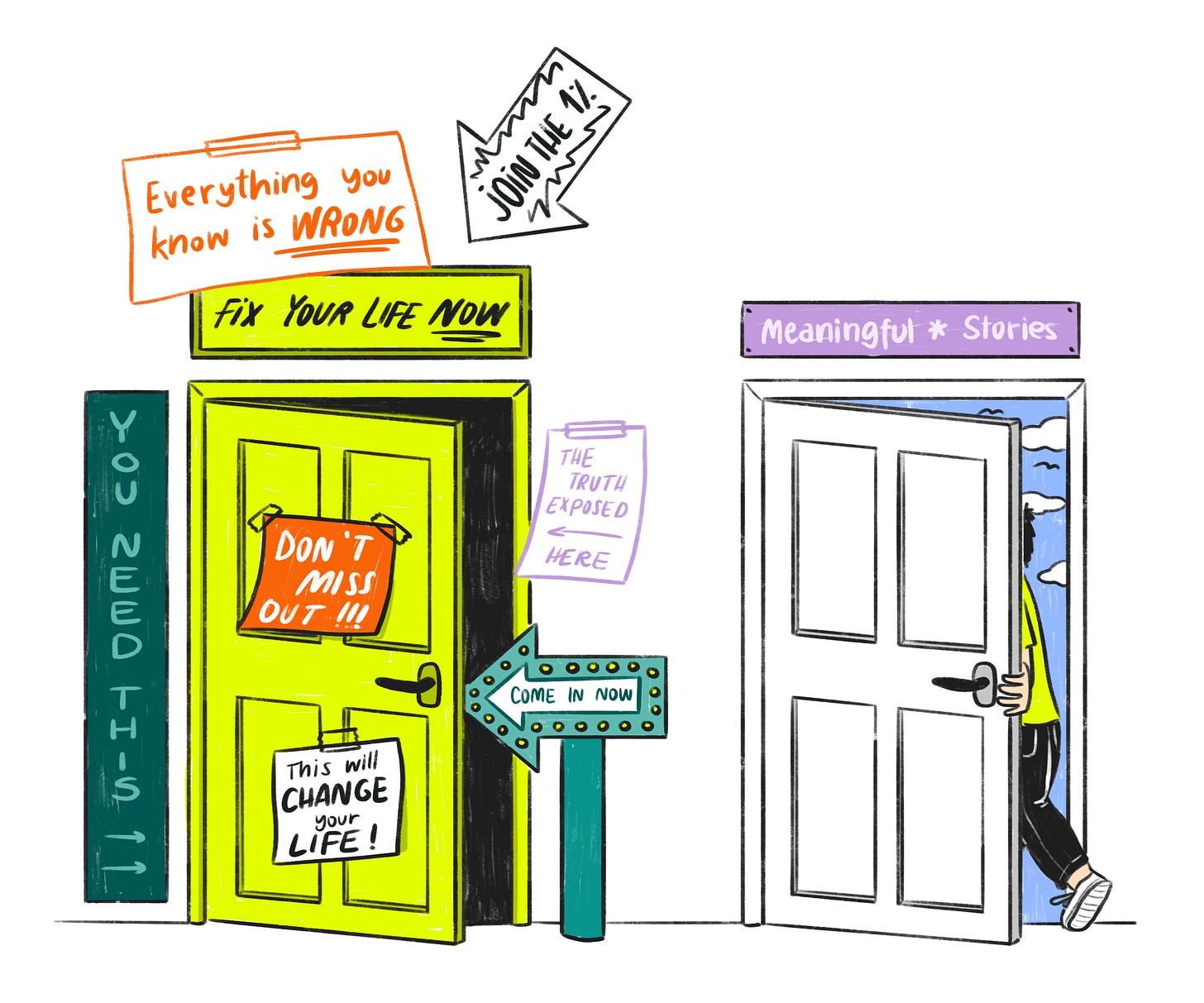Every hook is a door. Few lead to meaning.
Who are we creating for, the algorithm or the human?
We’re hooked. And not in a good way.
I used to see hooks as harmless tools. Just a smart way to grab attention, like offering someone a seat before you start the conversation.
But lately, they’ve started to feel like trapdoors. You fall in, and by the time you realize there’s no exit, you’ve already watched five videos about why your productivity habits are actually holding you back.
The hook obsession
More and more YouTubers, writers, and creators are obsessing over hooks and thumbnails.
They try to make them intriguing, and even if the actual content has depth and quality, it feels like too many are investing their time and energy into something surface-level.
It’s not that the content isn’t good, it’s that we’re losing the part of it that feels human. It’s the integrity, the part that trades performance for honesty, reach for relationship.
Because when the packaging takes center stage, the soul of the message starts to blur.
A hook doesn’t bring value on its own. It just pulls you in. Sure, it might lead you to something meaningful eventually, but the trade-off is getting out of hand. So many thumbnails lean into negativity, exaggeration, or absolutism, like:
“if you do X, then you must do Y”
“here’s why you’re failing”
“everything you know is wrong.”
There’s no room for nuance. Everything feels critical, urgent, extreme.
It’s exhausting.
And the irony? Everyone’s saying “slow down,” while making content that screams run faster.
We came for truth, got trapped by titles
We all want truth. Real stories that touch us, lessons that matter, moments that connect. But too often, what we get instead are titles designed to trap us, catchy hooks that grab at our attention but don’t deliver the depth we crave.
A hook can spark curiosity, sure. But hooks are just bait. They pull you in, but rarely let you stay long enough to find anything real. Lately, it feels less like an invitation and more like a rush of emotion meant to trigger, not to nurture.
We crossed a line. Hooks stopped being clever openers and turned into urgent, exaggerated warnings. There’s no room left for doubt, reflection, or complexity. Everything is black or white. Everything feels heavy and dark.
Most creators talk about reducing screen time and taking breaks, yet the pressure to craft the perfect hook keeps us trapped in the very cycle we’re trying to escape.
Maybe it’s time to shift focus. To care less about the trap of the title, and more about the value we truly want to share.
What we’re missing when we play the game
Some of the most meaningful work never gets seen. Not because it lacks care or truth, but because it refuses to compete on the terms that now run the show.
The louder things rise. The honest things wait.
And in that waiting, voices that could steady us, words that could heal, stories that don’t need to perform to matter are pushed aside.
We say we want real connection, but the tools we use are built to reward speed, not depth. So we adjust. We optimize. We title things more sharply, not because it’s who we are, but because it’s what we’re told works.
We say we care about people, about building thoughtful communities, but in chasing faster growth and broader reach, we’ve started designing content for algorithms instead of humans. We want more listeners, more readers, but at what cost?
The long-time follower, the loyal reader, the person who actually cares, they don’t need to be tricked. They don’t need a dopamine trap to show up. They’re here for truth. For stories. For trust. The very things we risk sacrificing in this hook-driven circus.
So what do we do?
Maybe we do need to step back for a moment and ask — what are we really trying to build? And who are we really here for?
And what if we paused? What if we stopped feeding the urgency?
What if our content felt less like a panic attack and more like a conversation? What if instead of hacking growth, we chose to build slowly, honestly? Maybe it wouldn’t go viral, but it would go deep. And maybe that’s the kind of impact that actually lasts.
Yes, we can care about headlines, but not at any cost.
Because the cost is attention without depth. Reach without resonance. Growth without meaning. And we’ve had enough of that.
Let’s create what calms people, what grounds them.
Let’s serve the people already listening, not chase the ones who never stay.
We don’t need to burn the internet down, but we do need a shift in intention, in tone, and in the tactics we follow.
There's always another way.
We can write openings instead of traps — honest beginnings that don’t manipulate, but invite. We can trade hype for curiosity, and see what happens when we speak to understand.
Maybe it’s time we try “anti-hooks” – a quiet question, a single sentence that feels like someone reaching out, a moment of real reflection.
We can give people clarity instead of confusion — with summaries, topic lists, and chapter-like markers that offer a gentle frame instead of a dopamine trap.
Even Ali Abdaal, one of the most algorithm-savvy creators, shared that the most rewarding work he’s done didn’t explode but it endured. Because it wasn’t optimized for attention. It was optimized for meaning.
And then there’s Lex Fridman. He doesn’t chase the algorithm at all. He treats every episode like a moment worth preserving. You always know what the conversation will explore, and that’s enough. And somehow, that quiet confidence draws people in deeper than any viral hook ever could.
So the real hook? Not needing one.
Let it be enough
When we stop writing for the algorithm and start writing for the actual human being on the other side, we remember what this was all for. Not the views, not the virality, but the connection. The way people resonate with our content and the kinds of sentences that land and stay.
So let’s give ourselves permission to trust that. Let’s believe that a slower, quieter kind of growth can still take us where we need to go.
Because the real work, the work that matters, just needs to speak.
And if that means fewer eyes, but deeper hearts, let that be enough.
Cris






